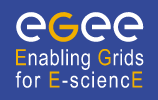Speaker
Report on the experience (or the proposed activity). It would be very important to mention key services which are essential for the success of your activity on the EGEE infrastructure.
Because of the universal view taken in this project, a large set of applications, covering the whole spectra of CS types, from a totally opportunistic to an ideally parallel implementation, is needed. Such use cases are not only a set of demonstrations of the developing technology, but the driving force to design grid tools that may be taken as standard in any CS simulation one may encounter.
We describe a general framework for dealing with Complex Systems Simulations (CSS) in a Grid environment. The framework is based on a unifying agent based modeling (ABM) approach. We consider the following problems: (1) basic definitions (2) communication topologies (3) parallelization.
Describe the scientific/technical community and the scientific/technical activity using (planning to use) the EGEE infrastructure. A high-level description is needed (neither a detailed specialist report nor a list of references).
As members of the EC-funded QosCosGrid consortium (www.qoscosgrid.eu) we are using the Globus 4.0 toolkit for developing grid middleware for grid enabled Complex Systems applications.
Describe the added value of the Grid for the scientific/technical activity you (plan to) do on the Grid. This should include the scale of the activity and of the potential user community and the relevance for other scientific or business applications
Many real-world systems involve large numbers of highly interconnected heterogeneous elements. Such structures, known as complex systems (CS), typically exhibit non-linear behavior and emergence. The methodologies used to understand their properties involve modeling, simulation and often require considerable computational resources such that only supercomputers and/or grids can deliver. Currently there is no grid technology with the capability to harness the available grid resources and provide an environment computationally equivalent to a supercomputer service.
This paper is part of a project the aim of which is to develop core grid technology capable of providing quasi-opportunistic supercomputing grid services and technology for CSS-s. The test bed used to evaluate this quasi-supercomputing grid technology will consist of a number of diverse CSS applications operating as part of complex problem-solving environment.
Abstracts for online demonstrations must provide a summary of the demo content. Places for demos are limited and this summary will be used as part of the selection procedure. Please include the visual impact of the demo and highlight any specific requirements (e.g. network connection). In general, a successful demo is expected to have some supporting material (poster) and be capable of running on a single screen or projector.
We present results and demonstrations of a parameter sweep application for CS written in RePast / Java featuring a Windows-based GUI and running under ProActive and Globus on the European grid spanned by CosCosGrid machines.




